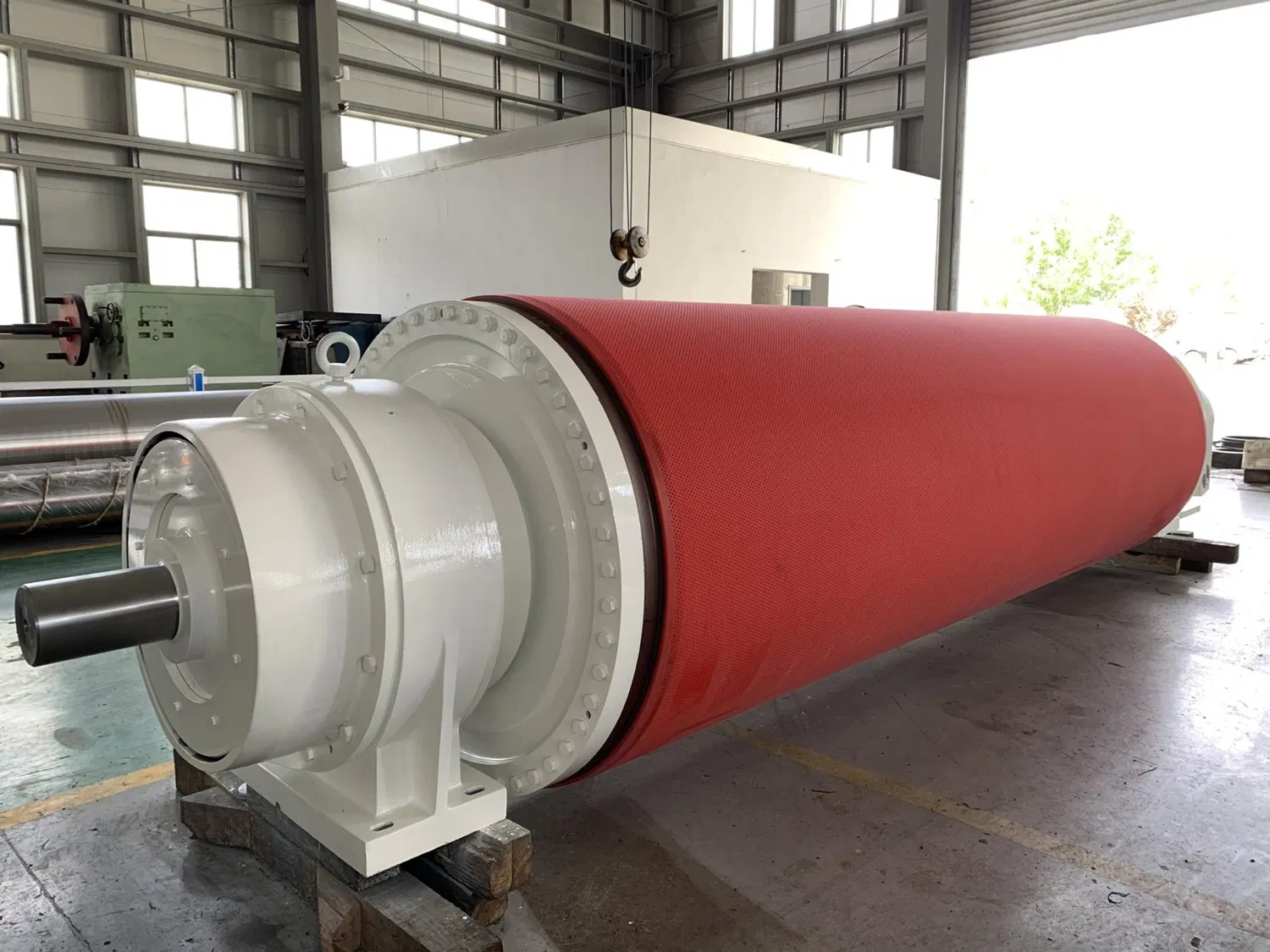The Yankee dryer roll stands as a critical component in the paper manufacturing process, particularly in the production of tissue, towel, and specialty papers. Its primary function is to efficiently dry the paper web after it leaves the forming section, using steam heat transferred through its metallic shell. Given the immense pressures, high temperatures, and continuous operation these rolls endure, achieving extended service life is not merely desirable but absolutely essential for operational efficiency and cost-effectiveness in paper mills. Failures or premature wear of Yankee dryers can lead to significant downtime, costly repairs, and disruptions in production schedules. Therefore, advancements in metallurgy and manufacturing techniques are constantly being sought to enhance the durability, performance, and longevity of these vital pieces of equipment. The quest for extended service life is a continuous journey, driven by the need to minimize downtime and maximize productivity in the demanding paper industry.
Understanding the Demands on Yankee Dryer Rolls
Yankee dryer rolls operate under exceptionally demanding conditions that necessitate robust metallurgical solutions. Imagine a large rotating cylinder, often several meters in diameter and width, subjected to internal steam pressures reaching up to 10 bar and surface temperatures exceeding 170°C. Simultaneously, the roll experiences mechanical stresses from the tension of the paper web, the nip loads from press rolls, and the cyclical thermal stresses due to heating and cooling cycles. Furthermore, the corrosive environment within a paper mill, often characterized by moisture and chemical residues, poses a constant threat of corrosion and material degradation. The cumulative effect of these factors – thermal stress, mechanical stress, and corrosive attack – places immense strain on the dryer roll material. Traditional materials, while adequate for earlier generations of paper machines, often fall short of meeting the demands of modern high-speed, high-production lines. This is where metallurgical innovations become crucial, offering pathways to develop materials and manufacturing processes that can withstand these harsh operational realities and extend the lifespan of Yankee dryer rolls.
Limitations of Traditional Materials: Cast Iron and Steel
For many years, cast iron and carbon steel were the workhorses in Yankee dryer roll construction. Cast iron, particularly gray cast iron, offered good thermal conductivity and machinability, making it a relatively economical choice. However, cast iron suffers from inherent limitations. Its tensile strength and impact resistance are relatively low, making it susceptible to cracking and brittle fracture under high stress or thermal shock conditions. Carbon steel, while stronger than cast iron, is prone to corrosion, especially in the humid and chemically active environment of a paper mill. Moreover, both materials exhibit limitations in terms of fatigue resistance, meaning they can degrade over time under repeated stress cycles, eventually leading to failure. As paper machine speeds and operating temperatures have increased over the decades, the limitations of these traditional materials have become more pronounced. The need for materials with enhanced strength, toughness, corrosion resistance, and fatigue life has become increasingly critical to ensure the reliable and extended operation of modern Yankee dryers. This realization has spurred significant research and development efforts in metallurgical innovations.
Metallurgical Innovations: The Rise of Advanced Alloys
To overcome the limitations of traditional materials, the field of Yankee dryer roll manufacturing has witnessed a significant shift towards advanced alloys. These alloys, often incorporating carefully selected alloying elements, are engineered to provide superior performance characteristics tailored to the demanding operational environment. For instance, alloyed steels with higher chromium and nickel content offer significantly improved corrosion resistance, mitigating the detrimental effects of moisture and chemicals. Furthermore, advancements in steelmaking processes have led to cleaner steels with reduced impurities and improved homogeneity, enhancing their mechanical properties and fatigue life. Another notable innovation is the use of specialized stainless steels or duplex stainless steels for critical components or surface layers of the dryer roll. These materials offer exceptional corrosion resistance and can withstand higher operating temperatures compared to conventional carbon steels. The selection of the most appropriate alloy depends on a variety of factors, including the specific operating conditions of the paper machine, the type of paper being produced, and the desired service life of the dryer roll. The careful engineering and selection of these advanced alloys are at the heart of extending the operational lifespan of Yankee dryer rolls.
High-Strength Steel and Enhanced Heat Resistance
One of the key metallurgical innovations for extending Yankee dryer roll service life is the development and application of high-strength steels with enhanced heat resistance. These steels are formulated to maintain their mechanical properties at elevated temperatures, resisting softening and creep, which are common degradation mechanisms in traditional steels under prolonged exposure to heat. The addition of alloying elements like molybdenum, vanadium, and niobium contributes to the improved high-temperature strength and creep resistance. These elements form fine precipitates within the steel microstructure, which impede dislocation movement and thereby enhance strength and stability at elevated temperatures. Furthermore, these high-strength steels often exhibit improved fatigue resistance, crucial for withstanding the cyclical thermal and mechanical stresses experienced by Yankee dryer rolls. The use of these advanced steels allows dryer rolls to operate at higher steam pressures and temperatures, leading to improved drying efficiency and increased production rates, without compromising the structural integrity or longevity of the roll. This represents a significant step forward in optimizing both the performance and durability of Yankee dryer rolls.
Surface Engineering: Coatings and Treatments for Enhanced Durability
Beyond bulk material selection, surface engineering plays a vital role in extending the service life of Yankee dryer rolls. The surface of the roll is the primary interface with the paper web and is directly exposed to wear, corrosion, and potential damage. Therefore, applying specialized coatings and surface treatments can significantly enhance the roll's resistance to these degradation mechanisms. One widely used technique is chromium plating, which provides a hard, wear-resistant, and corrosion-resistant surface. However, alternative coatings such as thermal spray coatings are gaining prominence. Thermal spray coatings, including ceramic coatings and metallic coatings, can be tailored to provide specific properties like enhanced wear resistance, corrosion protection, or even improved heat transfer characteristics. For example, ceramic coatings can offer exceptional hardness and wear resistance, while specialized metallic coatings can provide superior corrosion protection in harsh chemical environments. Furthermore, surface treatments like nitriding or carburizing can be applied to enhance the surface hardness and fatigue resistance of the base material. The choice of surface engineering technique depends on the specific operational challenges and the desired performance characteristics, but it is undeniably a crucial aspect of maximizing the service life of Yankee dryer rolls.
Optimized Design and Manufacturing for Longevity
Metallurgical innovations are not solely limited to material selection and surface treatments; optimized design and manufacturing techniques also contribute significantly to extended service life. Modern Yankee dryer rolls are often designed using advanced finite element analysis (FEA) to precisely predict stress distributions and identify potential weak points. This allows engineers to optimize the roll geometry and wall thickness to minimize stress concentrations and improve overall structural integrity. Furthermore, advancements in manufacturing processes, such as improved casting techniques and precision machining, ensure tighter tolerances and reduce residual stresses in the roll. For instance, controlled cooling during casting and stress-relieving heat treatments after machining are crucial for minimizing internal stresses that can contribute to premature failure. The combination of optimized design and precise manufacturing, coupled with advanced material selection, creates a synergistic effect, resulting in Yankee dryer rolls that are not only more durable but also perform more efficiently and reliably over extended periods. Have you ever considered how much precision is involved in crafting these massive, yet delicate, pieces of machinery? It's truly a testament to engineering prowess.
Non-Destructive Testing and Condition Monitoring
Even with the most advanced metallurgical innovations and manufacturing techniques, proactive maintenance and monitoring are essential for ensuring the long-term reliability of Yankee dryer rolls. Non-destructive testing (NDT) methods play a critical role in assessing the internal condition of the roll without causing damage. Techniques like ultrasonic testing, eddy current testing, and radiographic testing can detect internal flaws, cracks, or corrosion that may not be visible externally. Regular NDT inspections allow for early detection of potential problems, enabling timely repairs or preventative measures to be taken before catastrophic failures occur. Furthermore, condition monitoring systems, which continuously track parameters like temperature, vibration, and strain, provide valuable insights into the operational health of the dryer roll. These systems can detect anomalies and deviations from normal operating patterns, indicating potential issues that require attention. By combining regular NDT inspections with continuous condition monitoring, paper mills can proactively manage the health of their Yankee dryer rolls, maximizing their service life and minimizing unexpected downtime. This proactive approach is far more cost-effective than reactive repairs following a breakdown.
Practical Applications and Case Studies: Real-World Impact
The metallurgical innovations discussed are not just theoretical concepts; they have tangible impacts in real-world paper manufacturing operations. Numerous case studies demonstrate the effectiveness of advanced alloys and surface engineering techniques in extending Yankee dryer roll service life. For example, paper mills that have transitioned from traditional cast iron rolls to alloy steel rolls have reported significant increases in operational lifespan and reduced downtime due to failures. Similarly, the application of thermal spray coatings has been shown to dramatically improve the wear and corrosion resistance of dryer roll surfaces, leading to extended maintenance intervals and reduced replacement costs. In my experience, witnessing the direct benefits of these innovations in actual mill environments is incredibly rewarding. The implementation of non-destructive testing and condition monitoring programs has also proven to be highly effective in preventing catastrophic failures and optimizing maintenance schedules. These practical examples underscore the value and return on investment associated with embracing metallurgical advancements in Yankee dryer roll technology. The gains are not just in terms of extended lifespan, but also in improved operational efficiency and reduced overall costs.
Our Contribution to Extended Yankee Dryer Roll Life
At our company, we are deeply committed to providing cutting-edge solutions that address the challenges of Yankee dryer roll longevity. We leverage the latest metallurgical innovations and manufacturing expertise to produce high-performance dryer rolls designed for extended service life. Our products incorporate advanced alloy steels, optimized designs based on FEA, and precision manufacturing processes to ensure superior durability and reliability. Furthermore, we offer a range of surface engineering options, including thermal spray coatings and specialized surface treatments, to tailor the roll surface properties to specific operating conditions and paper types. We also provide comprehensive non-destructive testing and condition monitoring services to support our customers in proactively managing the health of their dryer rolls. Our aim is to partner with paper mills to minimize downtime, reduce maintenance costs, and maximize the productivity of their paper manufacturing operations through our innovative Yankee dryer roll solutions. We understand the critical role these rolls play, and our products are engineered to deliver performance and longevity you can depend on.
Conclusion: The Future of Yankee Dryer Roll Technology
The pursuit of extended service life for Yankee dryer rolls is an ongoing endeavor, driven by the ever-increasing demands of the paper industry. Metallurgical innovations, encompassing advanced alloys, surface engineering, optimized design, and proactive maintenance strategies, are at the forefront of this quest. By embracing these advancements, paper mills can significantly enhance the durability, reliability, and performance of their dryer rolls, leading to reduced downtime, lower operating costs, and increased production efficiency. Frankly speaking, the future of Yankee dryer roll technology is inextricably linked to continued progress in materials science and engineering. As new alloys and manufacturing techniques emerge, we can expect even further improvements in the service life and operational capabilities of these critical components. The focus will remain on pushing the boundaries of material performance to meet the evolving needs of the paper industry, ensuring sustainable and efficient paper production for years to come. The journey of innovation in Yankee dryer roll metallurgy is far from over, and the potential for future advancements is truly exciting.
For more detailed information, please visit our official website: Yankee Dryer Rolls



